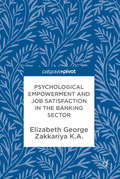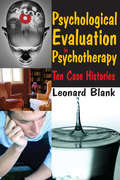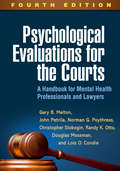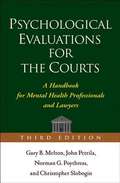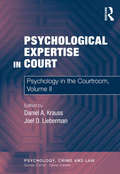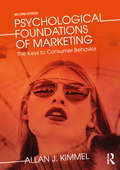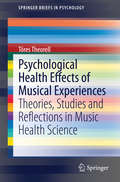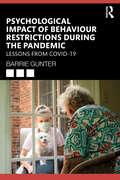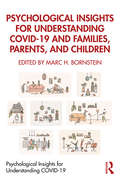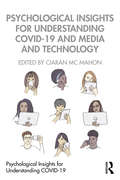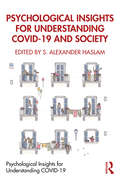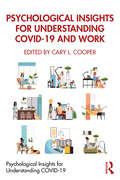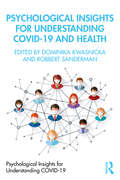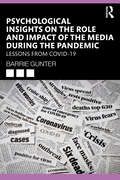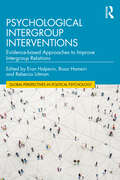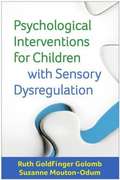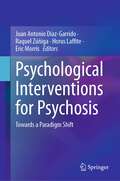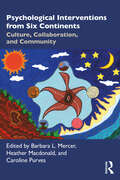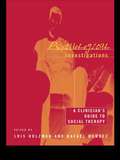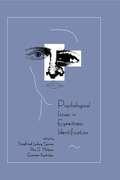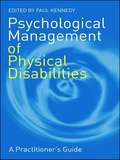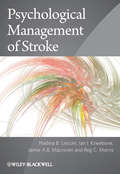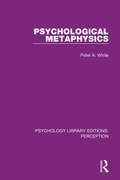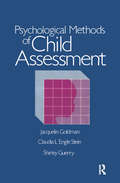- Table View
- List View
Psychological Empowerment and Job Satisfaction in the Banking Sector
by Elizabeth George Zakkariya K. A.This book explores how psychological empowerment can influence and enhance job satisfaction. The authors argue that in today’s working climate the wellbeing and involvement of employees is of utmost importance to any company’s overall success and that management techniques like empowerment are the most effective means of achieving this goal. Based on an empirical study examining job satisfaction amongst employees of several private sector, public sector and new generation banks in Kerala, India as well as extensive literature review, this book discusses the role psychological empowerment plays in enhancing job satisfaction both locally and internationally. It goes on to analyze four dimensions of psychological empowerment and the role of job satisfaction in the relationship between psychological empowerment and job related stress. This book will be of great interest to scholars in management and psychology and is essential reading for industrialists and managers wanting to apply empowerment strategies in their own workplace.
Psychological Evaluation in Psychotherapy: Ten Case Histories
by Leonard BlankWritten by a scholar who is a therapist and a psychodiagnostician, this book documents the direct relationship between patient response patterns to a battery of psychological tests, and their subsequent behavior in psychotherapy. Unlike other books in the field, which concentrate on psychodiagnostics or psychological report writing, Blank takes the reader, session-by-session, through the therapeutic notes of ten patients who were in therapy. At each step of the way, patient behavior in therapy is shown alongside test response patterns.This book, first published in 1965, continues to provide a major contribution, both as a practical manual and as a reference book for clinical psychologists, psychiatrists, social workers, trainees and students. Anyone who is interested in using psychological evaluations to better understand the intricacies of the therapeutic process will fi nd the book an invaluable aid. So also will those who want to sharpen their diagnostic skills as part of theory construction.The author also provides a description and rationale of commonly employed psycho-diagnostic techniques, diagnostic overviews for each of the ten patients emphasizing the dynamics of differing diagnostic patterns and their prognostic implications, complete test data and process therapy notes for each of the ten patients, and an analysis of the complex interplay of personality resources of the patient, the personality of the therapist and the fortuitous circumstances that enter into every therapeutic situation.
Psychological Evaluations for the Courts, Fourth Edition: A Handbook for Mental Health Professionals and Lawyers
by John Petrila Randy K. Otto Gary B. Melton Norman G. Poythress Christopher Slobogin Douglas Mossman Lois O. CondieTens of thousands of readers have relied on this leading text and practitioner reference--now revised and updated--to understand the issues the legal system most commonly asks mental health professionals to address. Highly readable, the volume demystifies the forensic psychological assessment process and provides guidelines for participating effectively and ethically in legal proceedings. Presented are clinical and legal concepts and evidence-based assessment procedures pertaining to criminal and civil competencies, the insanity defense and related doctrines, sentencing, civil commitment, personal injury claims, antidiscrimination laws, child custody, juvenile justice, and other justice-related areas. Case examples, exercises, and a glossary facilitate learning; 19 sample reports illustrate how to conduct and write up thorough, legally admissible evaluations. New to This Edition *Extensively revised to reflect important legal, empirical, and clinical developments. *Increased attention to medical and neuroscientific research. *New protocols relevant to competence, risk assessment, child custody, and mental injury evaluations. *Updates on insanity, sentencing, civil commitment, the Americans with Disabilities Act, Social Security, juvenile and family law, and the admissibility of expert testimony. *Material on immigration law (including a sample report) and international law. *New and revised sample reports.
Psychological Evaluations for the Courts, Third Edition
by Gary Melton John PetrilaThis is the definitive reference and text for both mental health and legal professionals. The authors offer a uniquely comprehensive discussion of the legal and clinical contexts of forensic assessment, along with best-practice guidelines for participating effectively and ethically in a wide range of criminal and civil proceedings. Presented are findings, instruments, and procedures related to criminal and civil competencies, civil commitment, sentencing, personal injury claims, antidiscrimination laws, child custody, juvenile justice, and more.
Psychological Expertise in Court: Psychology in the Courtroom, Volume II (Psychology, Crime, And Law Ser.)
by Daniel A. KraussExpertise in Court: Perspectives on Testimony is the second of a two-volume set on the Psychology of the Courtroom. The authors, a renowned group of psychology and legal scholars, offer definitive coverage of the use of psychological expert testimony and evidence in a variety of legal contexts. They explore the controversies that surround it, from questions of its admissibility to its effects on eventual juror decisions. A wide range of topics are covered including system and estimator variables in eyewitness identification, expert testimony on psychological syndromes, the insanity defence and sexual harassment, how child sexual abuse is used by the courts, and recent research on false confessions. They also provide a comparative analysis exploring how different types of psychological expert testimony and evidence are used by different countries’ legal systems. All the chapters conclude by making specific recommendations for how psychological research and information could be better utilized by courts around the world.
Psychological Foundations of Marketing: The Keys to Consumer Behavior
by Allan J KimmelThis is the only textbook to provide an applied, critical introduction to the role of psychology in marketing, branding and consumer behavior. Ideally suited for both students and professionals, the new edition is a complete primer on how psychology informs and explains marketing strategies, and how consumers respond to them. The book provides comprehensive coverage of: Motivation: the human needs at the root of many consumer behaviors and marketing decisions. Perception: the nature of perceptual selection, attention, and organization and how they relate to the evolving marketing landscape. Decision making: how and under what circumstances it is possible to predict consumer choices, attitudes, and persuasion. Personality and lifestyle: how insight into consumer personality can be used to formulate marketing plans. Social behavior: the powerful role of social influence on consumption. Now featuring case studies throughout to highlight how psychological research can be applied in the marketplace, and insightful analysis of the role of digital media and new technologies, this award-winning textbook is required reading for anyone interested in this fascinating and evolving subject.
Psychological Health Effects of Musical Experiences
by Töres TheorellThis book is about links between music and health. It focuses on music and public health, and, in particular, the potentially positive and negative effects of listening to and making music on the health of the general population. The book starts out by discussing the protection music offers against adverse effects of stress. It then discusses social aspects of music production and listening and examines religious music within the framework of social functioning. It offers insight into the physiological and psychological effects of music listening, the biological effects of singing, and the use of music in therapeutic situations and the rearing of children. The book concludes by discussing the significance of music for musicians and their health. Although it may seem that music has only good health effects, and therefore all professional musicians should be healthy, not all music effects are positive. The book describes situations in which music has negative health effects and makes clear that there is a pronounced difference between living with music for joy and to earn one´s living from making music. In the latter situation, performance anxiety may become a factor that affects health adversely.
Psychological Impact of Behaviour Restrictions During the Pandemic: Lessons from COVID-19
by Barrie GunterThis volume examines the undesirable or harmful cognitive, emotional and behavioural side-effects of COVID-19 and of the behavioural restrictions imposed by governments on their populations during the pandemic. Societal "lockdowns" and other intervening behavioural restrictions, built significantly around social isolation, used by governments to control the spread of COVID-19 disrupted the lives of most people. There were economic costs for many as workplaces closed down, as well as severe stresses on friendships and romantic relationships, an increase in instances of abuse and domestic violence, and concerns about people drinking too much alcohol or gambling too much as compensatory behaviours. Understanding which people were at risk, and in what ways, could teach important lessons for the future. Presenting a timely review of the most recent international research and evidence, author Barrie Gunter assesses the major collateral, psychological side-effects of the pandemic. Looking forward, Gunter also considers how new models might be developed that take into account not just the need to halt the spread of a new virus, but also minimise collateral damage which could be every bit as severe in both the short term and long term. Identifying and analysing the nature and severity of collateral side-effects of pandemic-related behaviour restrictions, this is essential reading for students and researchers in psychology, public health and medical sciences and policymakers assessing government strategies, responses and performance.
Psychological Insights for Understanding COVID-19 and Families, Parents, and Children (Psychological Insights for Understanding COVID-19)
by Marc H. BornsteinWith specially commissioned introductions from international experts, the Psychological Insights for Understanding COVID-19 series draws together previously published chapters on key themes in psychological science that engage with people’s unprecedented experience of the pandemic. This volume collects chapters that address prominent issues and challenges presented by the SARS-CoV-2 pandemic to families, parents, and children. A new introduction from Marc H. Bornstein reviews how disasters are known to impact families, parents, and children and explores traditional and novel responsibilities of parents and their effects on child growth and development. It examines parenting at this time, detailing consequences for home life and economies that the pandemic has triggered; considers child discipline and abuse during the pandemic; and makes recommendations that will support families in terms of multilevel interventions at family, community, and national and international levels. The selected chapters elucidate key themes including children’s worry, stress and parenting, positive parenting programs, barriers which constrain population-level impact of prevention programs, and the importance of culturally adapting evidence-based family intervention programs. Featuring theory and research on key topics germane to the global pandemic, the Psychological Insights for Understanding COVID-19 series offers thought-provoking reading for professionals, students, academics, policy makers, and parents concerned with the psychological consequences of COVID-19 for individuals, families, and society.
Psychological Insights for Understanding COVID-19 and Media and Technology (Psychological Insights for Understanding COVID-19)
by Ciarán Mc MahonIn the Psychological Insights for Understanding COVID-19 series, international experts introduce important themes in psychological science that engage with people’s unprecedented experience of the pandemic, drawing together chapters as they originally appeared before COVID-19 descended on the world. This book explores how COVID-19 has impacted our relationship with media and technology, and chapters examine a range of topics including fake news, social media, conspiracy theories, belonging, online emotional lives and relationship formation, and identity. It shows the benefits media and technology can have in relation to coping with crises and navigating challenging situations, whilst also examining the potential pitfalls that emerge due to our increasing reliance on them. In a world where the cyberpsychological space is constantly developing, this volume exposes the complexities surrounding the interaction of human psychology with media and technology, and reflects on what this might look like in the future. Featuring theory and research on key topics germane to the global pandemic, the Psychological Insights for Understanding COVID-19 series offers thought-provoking reading for professionals, students, academics and policy makers concerned with the psychological consequences of COVID-19 for individuals, families and society.
Psychological Insights for Understanding COVID-19 and Society (Psychological Insights for Understanding COVID-19)
by S. Alexander HaslamIn the Psychological Insights for Understanding COVID-19 series, international experts introduce important themes in psychological science that engage with people’s unprecedented experience of the pandemic, drawing together chapters as they originally appeared before COVID-19 descended on the world. This book explores how COVID-19 has impacted society, and chapters examine a range of societal issues including leadership and politics, community, social status, welfare, social exclusion and accountability. Addressing the social and psychological processes that structure, and are structured by, our social contexts, it shows not only how groups and individuals can come together to manage global crises, but also how these crises can expose weaknesses in our society. The volume also reflects on how we can work together to rebuild society in the aftermath of the pandemic, by cultivating a shared sense of responsibility through social integration and responsible leadership. Showcasing theory and research on key topics germane to the global pandemic, the Psychological Insights for Understanding COVID-19 series offers thought-provoking reading for professionals, students, academics and policy makers concerned with the psychological consequences of COVID-19 for individuals, families and society.
Psychological Insights for Understanding COVID-19 and Work (Psychological Insights for Understanding COVID-19)
by Cary L. CooperIn the Psychological Insights for Understanding COVID-19 series, international experts introduce important themes in psychological science that engage with people’s unprecedented experience of the pandemic, drawing together chapters as they originally appeared before COVID-19 descended on the world. This timely and accessible book brings together a selection of chapters offering insights into issues surrounding work and the COVID-19 pandemic. Featuring content on topics such as health and wellbeing, work-family, flexible hours, organisational communication, talent management, recovery from work, employee engagement and flourishing, burnout, and organisational interventions, the book includes a specially written introduction contextualising the chapters in relation to the COVID-19 crisis. Reflecting on how psychological research is relevant during a significant global event, the introduction examines the potential future impact of the pandemic on the practice and study of psychology and our lives more generally. Featuring theory and research on key topics germane to the global pandemic, the Psychological Insights for Understanding COVID-19 series offers thought-provoking reading for professionals, students, academics and policy makers concerned with the psychological consequences of COVID-19 for individuals, families and society.
Psychological Insights for Understanding Covid-19 and Health (Psychological Insights for Understanding COVID-19)
by Dominika Kwasnicka; Robbert SandermanWith specially commissioned introductions from international experts, the Psychological Insights for Understanding COVID-19 series draws together previously published chapters on key themes in psychological science that engage with people’s unprecedented experience of the pandemic. In this volume on health, Dominika Kwasnicka and Robbert Sanderman introduce chapters that explore the crucial topics of health behaviour change, wellbeing, stress, and coping. They highlight the key role digital health technologies can play in how we manage health conditions, and how we facilitate change to help individuals manage stressful situations such as physical isolation, job loss, and financial strain during the COVID-19 pandemic. The volume also offers an important overview of environmental and policy-based approaches to health behaviour change and addresses the highly relevant issues of identity and trust and how they shape the health of individuals, communities, and society. Highlighting theory and research on these key topics germane to the global pandemic, the Psychological Insights for Understanding COVID-19 series offers thought-provoking reading for professionals, students, academics, and policymakers concerned with psychological consequences of COVID-19 for individuals, families, and society.
Psychological Insights on the Role and Impact of the Media During the Pandemic: Lessons from COVID-19
by Barrie GunterThis volume places the spotlight on the role different media and communications systems played in informing the public about the pandemic, shaping their views about what was happening and contributing to behavioural compliances with pandemic-related restrictions. Throughout the pandemic, media coverage has played an important role in drawing attention to specific messages, influencing public risk perceptions and fear responses. Mainstream media and other electronic communication systems such as Facebook and WhatsApp have been pivotal in getting pandemic information out to the public, thereby influencing their beliefs, attitudes and behaviour and engaging them generally in the pandemic as stakeholders. In this timely volume, author Barrie Gunter considers how people reacted to this coverage and its contribution to their understanding of what was going on, including the influence of fake news and misinformation on public beliefs about the pandemic, from anti-lockdown protests to the "anti-vaxx" movement. In addition, looking at how government messaging was not always consistent or clear and how different authorities were found not always to be in harmony or compliance with the messages they put out, Gunter examines the harm done by presenting different publics with ambiguous or conflicting narratives. Drawing out important communications strategy lessons to be learned for the future, this is essential reading for students and researchers in psychology, public health and medical sciences and for policymakers who assess government strategies, responses and performance.
Psychological Intergroup Interventions: Evidence-based Approaches to Improve Intergroup Relations (Global Perspectives in Political Psychology)
by Eran Halperin Boaz Hameiri Rebecca LittmanThis book introduces a comprehensive and integrative collection of psychological intergroup interventions. These evidence-based interventions are scientifically established and tested in several real-world contexts of intergroup animosities and tensions, from prejudice and inequality reduction to peace promotion. Intergroup hostility, violence, and discrimination have become more and more prevalent in recent decades. To address this challenge, recently, social scientists have shown an increasing shift from a descriptive to a more interventionist science, developing evidence-based interventions to improve intergroup relations. For the first time, this book includes research on intergroup interventions and their applications to the field, from a global collection of leading voices in the discipline. It also includes a conceptualization of intergroup interventions, a typology of different types of interventions, as well as a guideline for effective development of intergroup interventions. Each chapter focuses on one psychological intergroup intervention, further reviewing a sample of relevant platforms such as education, entertainment, and VR, upon which psychological intergroup interventions can be implemented. With each chapter featuring both intervention research and practical advice for practitioners, this is the ideal companion for researchers and professionals in social psychology, sociology, politics, peace studies and conflict resolution. It will also be of interest to practitioners looking for practical advice to create an impact in the real-world.
Psychological Interventions for Children with Sensory Dysregulation
by Suzanne Mouton-Odum Ruth Goldfinger GolombSensory processing difficulties can lead to puzzling, hard-to-treat emotional and behavioral challenges in children and adolescents. For example, children who can't filter normal background sounds may seem anxious, those oversensitive to touch may seem phobic, and those who seek sensory input may appear hyperactive. Filled with case vignettes, this highly informative guide helps mental health clinicians recognize and address sensory dysregulation that may co-occur with or be misdiagnosed as anxiety disorders, attention-deficit/hyperactivity disorder, and other psychological or behavioral problems. In rich detail, the authors illustrate how to modify cognitive-behavioral therapy and other evidence-based interventions to meet this population's unique needs and make treatment more effective. Reproducible clinical tools can be downloaded and printed in a convenient 8 1/2" x 11" size.
Psychological Interventions for Psychosis: Towards a Paradigm Shift
by Eric Morris Juan Antonio Díaz-Garrido Raquel Zúñiga Horus LaffiteThis book shows how psychological and social interventions can help people with psychosis. It brings together both theoretical chapters that contribute to the reconceptualization of psychosis and clinical cases illustrating how contemporary psychotherapeutic intervention models can be applied in the treatment of this mental health condition, with reflections, strategies and practical guidelines demonstrating how these models can inform professional practice in mental healthcare. Chapters brought together in this volume aim to reflect a paradigm shift in psychosis care. They present person-centered models that lead to a way of seeing, understanding and treating psychosis that is very different from the traditional biomedical model. Current authors and approaches are revolutionizing an outdated model trapped in purely pharmacological actions and tautological explanations of a biological nature, where symptom control is the basic and fundamental form of approach, and in which psychotherapeutic actions take second place as subsidiary to the former. Approaches such as Acceptance and Commitment Therapy, Acceptance and Recovery Therapy by Levels, Open Dialogue, Compassion-Centered Therapy or the Hearing Voices movement, to name but a few of those presented in this book, represent a journey of self-knowledge and learning for those recovering from psychosis, and have an intense transformative potential for the therapeutic team. The fundamental principle that guides this book is to share models belonging to psychology that aim at personal development while respecting the needs, values and goals of each person, and that can be adopted by any professional or student of clinical psychology, psychiatry, nursing, social work or any other discipline searching for more humanistic approaches to treat psychosis.
Psychological Interventions from Six Continents: Culture, Collaboration, and Community
by Barbara L. MercerThis book presents psychological assessment and intervention in a cultural and relational context. A diverse range of contributors representing six continents and eleven countries write about their therapeutic interventions, all of which break the traditional assessor-as-expert-oriented framework and offer a creative adaptation in service delivery. A Collaborative/Therapeutic Assessment model, including work with immigrant communities, and Indigenous modalities underscore individual and collective case illustrations highlighting equality in the roles of the provider and the receiver of services. The universality and uniqueness of culture are explored as a construct and through case material. Some chapters describe a partnership with a Eurocentric scientific model, while others adopt a purely community method, preserved with Indigenous language and subjective methodology. This volume brings together diverse therapeutic collaborative ideas, and recognizes relational, community, and cultural psychologies as integral to mainstream assessment and intervention literature. This book is essential for psychologists and clinicians internationally and graduate students.
Psychological Investigations: A Clinician's Guide to Social Therapy
by Lois Holzman Rafael Mendez"Psychological Investigations" lets readers listen in on one of the most exciting developments in psychology today as it is unfolding. With the current trend in therapy reflecting a movement away from traditional psychology and towards more postmodern psychologies, social therapy, a psychotherapeutic approach developed by Fred Newman, emerges as a qualitatively new way of doing therapy. Social therapy blends philosophy, the arts, and political concerns into a group approach that focuses on improved social functioning. "Psychological" "Investigations" provides insight into the revolutionary development of social therapy--an improvisational, investigatory, development-focused method of treatment. Featuring dialogues drawn from transcripts of teaching and supervisory sessions between Newman and therapists, the book presents a comprehensive guide to the core philosophical and political issues of social therapy and the social therapeutic group process. Instead of introspection and insight--traditional means to self-realization--Newman and social therapy encourages activity, involvement and commitment to causes larger than the individual ego.
Psychological Issues in Eyewitness Identification
by Siegfried Ludwig Sporer Roy S. Malpass Guenter KoehnkenWhy do police officers, investigators, prosecutors, judges, and others with an interest in eliciting accurate memory-based testimony need to inform themselves of the research literature in experimental psychology that addresses the question of witness memory? The answer is straightforward, from the perspective of a simple cost/benefit analysis. As with so many matters in the administration of public funds, effectiveness holds important rewards. Those who investigate crimes and decide which line of investigation to pursue and which line to postpone or set aside, necessarily make judgments about the likely guilt of suspects based on the information at hand. If they can make these judgments with a high degree of accuracy, everyone benefits. For many cases eyewitness identification is an important component of evidence, prosecution, and plea negotiation. If witness identification is correctly implemented, investigators and prosecutors can make their judgments effectively, and focus their resources more efficiently. A major component of effectiveness requires avoiding expending scarce resources on erroneous prosecutions. It is in everyone's interest to make the best use of the memory of witnesses: to preserve it without changing it; to render it maximally accessible; to provide an environment in which witnesses feel free to report their recollections; and to accurately assess the probable validity of the witness's report, regardless of the witness's certainty or doubts about its accuracy. This volume gathers evidence from various research domains on eyewitness testimony. Although many of the studies discussed deal with eyewitness identification, it is noteworthy that many of them also touch upon other areas of concern to eyewitness researchers, including chapters on: *voice recognition by humans and computers, with particularly detailed instructions on conducting voice "lineup," *differential aspects of recognition memory in children, *elderly eyewitness' memory, *problems of cross-racial identification, *psychological aspects of facial image reconstruction techniques, *person descriptions, *particular benefits of reinstating context as a means to improve eyewitness memory, *problems associated with various research paradigms in the eyewitness arena, and *recommendations on how to conduct lineups and photospreads and their proper evaluation. Differentiated from other literature on this topic by its non-technical language and accessibility to non-professionals, this volume covers a great deal of ground, raises a host of questions, settles some others, and points the way to more effective use and evaluation of what eyewitnesses have to say.
Psychological Knowledge and Practices in Brazilian Colonial Culture (Latin American Voices)
by Marina MassimiThis book examines the complexities of the colonization of the territory that is now Brazil and its shaping of psychological knowledge and practice. It reveals the rich network of cultural practices that were formed through the appropriation of elements of Jesuit Catholicism and the blending with elements of the cultures of native, African and Lusitanian populations present in the territory, and how psychological concepts and practices emerged and circulated between the sixteenth and the late eighteenth centuries, long before the establishment of psychology as a modern science. The volume summarizes the research program developed by the author over 38 years of academic activity through which she contributed to expand the field of historical studies in psychology by investigating how psychological concepts and practices were produced in cultural and historical contexts different from the European and North American societies where scientific psychology developed in the 19th and 20th centuries. Psychological Knowledge and Practices in Brazilian Colonial Culture will be of interest not only to historians of psychology, but also to professional psychologists working with culturally diverse populations who seek to understand how psychological concepts and phenomena are shaped by culture. By doing so, the book intends to contribute to the development of a psychology better prepared to deal with cultural diversity in an increasingly multicultural world. “Massimi’s book will now form an important foundation of English-language scholarship about the psychological and cultural impact of colonization on subjugated peoples. She has, of course, made many such contributions in Portuguese. It is to be hoped that much of her work will be translated into English so that more scholars may benefit from the richness of her insights.” – Excerpt from the Foreword by Dr. Wade E. Pickren.
Psychological Management of Physical Disabilities: A Practitioner's Guide
by Paul KennedyThe successful integration of psychological factors into the management of physical disabilities is critical to successful health-care delivery. This book provides a comprehensive and accessible guide to the best practice and approaches in this field. Paul Kennedy brings together contributions from a range of experienced researchers and practitioners, who explore the emotional, motivational and psychological factors associated with the rehabilitation and treatment of people with a range of physical disabilities, including spinal cord injury, stroke, and chronic pain. The book is divided into three sections, covering: the scope of psychological processes in physical rehabilitation psychological applications and practitioner perspectives general organizational challenges and developments. The Psychological Management of Physical Disabilities will be of great interest to all clinical psychologists, health psychologists, occupational therapists, counsellors, physiotherapists, physicians and rehabilitation nurses. Service providers know how important psychological factors are. This book explains why and how psychological models and research can support rehabilitation and improve individual well-being.
Psychological Management of Stroke
by Ian I. Kneebone Jamie A. Macniven Nadina B. Lincoln Reg C. MorrisPsychological Management of Stroke presents a review and synthesis of the current theory and data relating to the assessment, treatment, and psychological aspects of stroke.Provides comprehensive reviews of evidence based practice relating to strokeWritten by clinical psychologists working in stroke servicesCovers a broad range of psychological aspects, including fitness to drive, decision making, prevention of stroke, and involvement of carers and familiesReviews and synthesizes new data across a wide range of areas relevant to stroke and the assessment, treatment, and care of stroke survivors and their familiesRepresents a novel approach to the application of psychological theory and principles in the stroke field
Psychological Metaphysics (Psychology Library Editions: Perception #33)
by Peter A. WhiteThe research literature on causal attribution and social cognition generally consists of many fascinating but fragmented and superficial phenomena. These can only be understood as an organised whole by elucidating the fundamental psychological assumptions on which they depend. Originally published in 1993, Psychological Metaphysics is an exploration of the most basic and important assumptions in the psychological construction of reality, with the aim of showing what they are, how they originate, and what they are there for. Peter A. White proposes that people basically understand causation in terms of stable, specific powers of things operating to produce effects under suitable conditions. This underpins an analysis of people’s understanding of causal processes in the physical word and of human action, which makes a radical break with the Heiderian tradition. Psychological Metaphysics suggests that causal attribution is in the service of the person’s practical concerns and any interest in accuracy or understanding is subservient to this. A notion of regularity in the world is of no more than minor importance in causal attribution, and social cognition is not so much a matter of cognitive mechanisms or processes but more of cultural ways of thinking imposed upon tacit, unquestioned, universal assumptions. Psychological Metaphysics incorporates not only research and theory in social cognition and developmental psychology, but also philosophy and the history of ideas. It will be challenging to everyone interested in how we try to understand the world.
Psychological Methods Of Child Assessment
by Jacquelin Goldman Claudia L'Engle SteinThis book provides some common background in child development and assists the provider of child assessment services to determine appropriate procedures to answer questions and investigate specific problems. It is intended for graduate students in child clinical psychology and school psychology.
